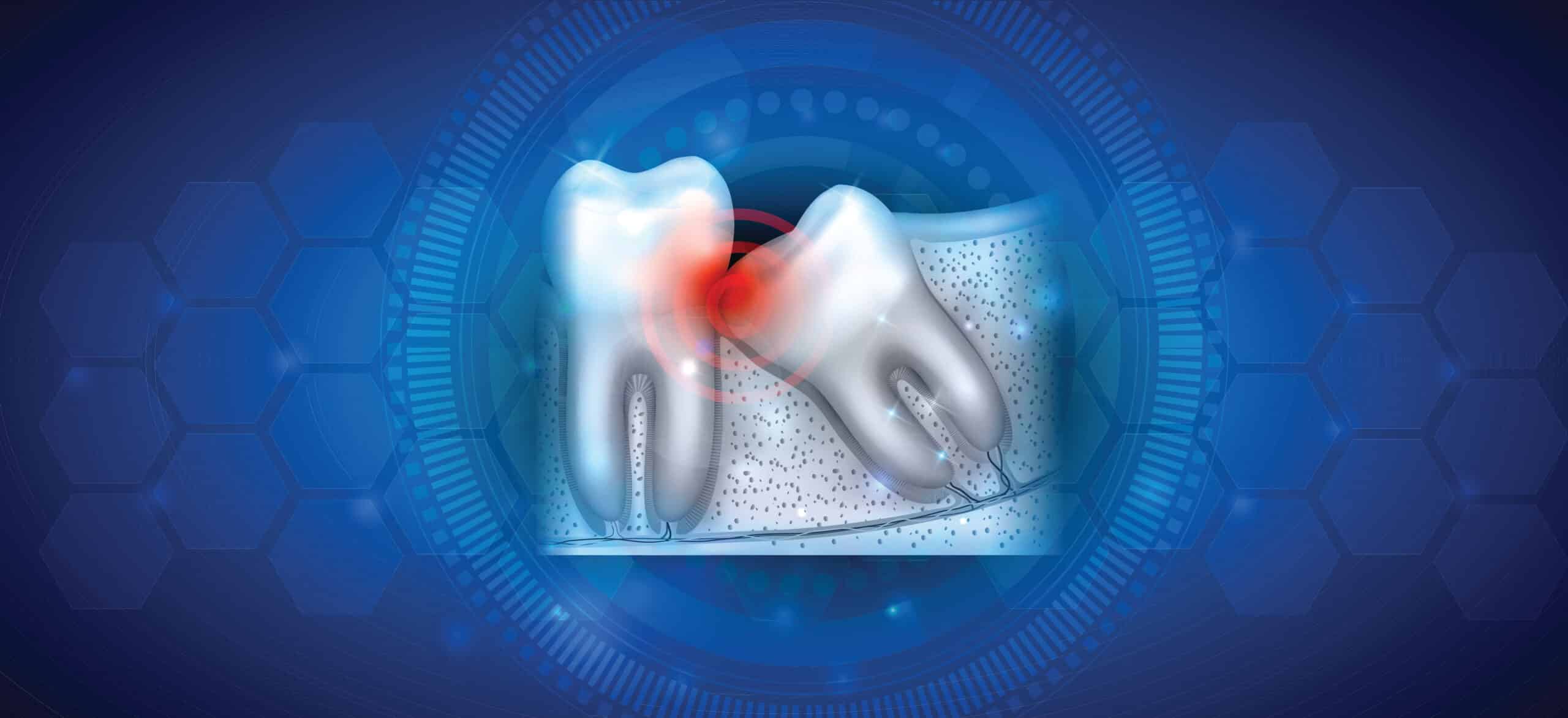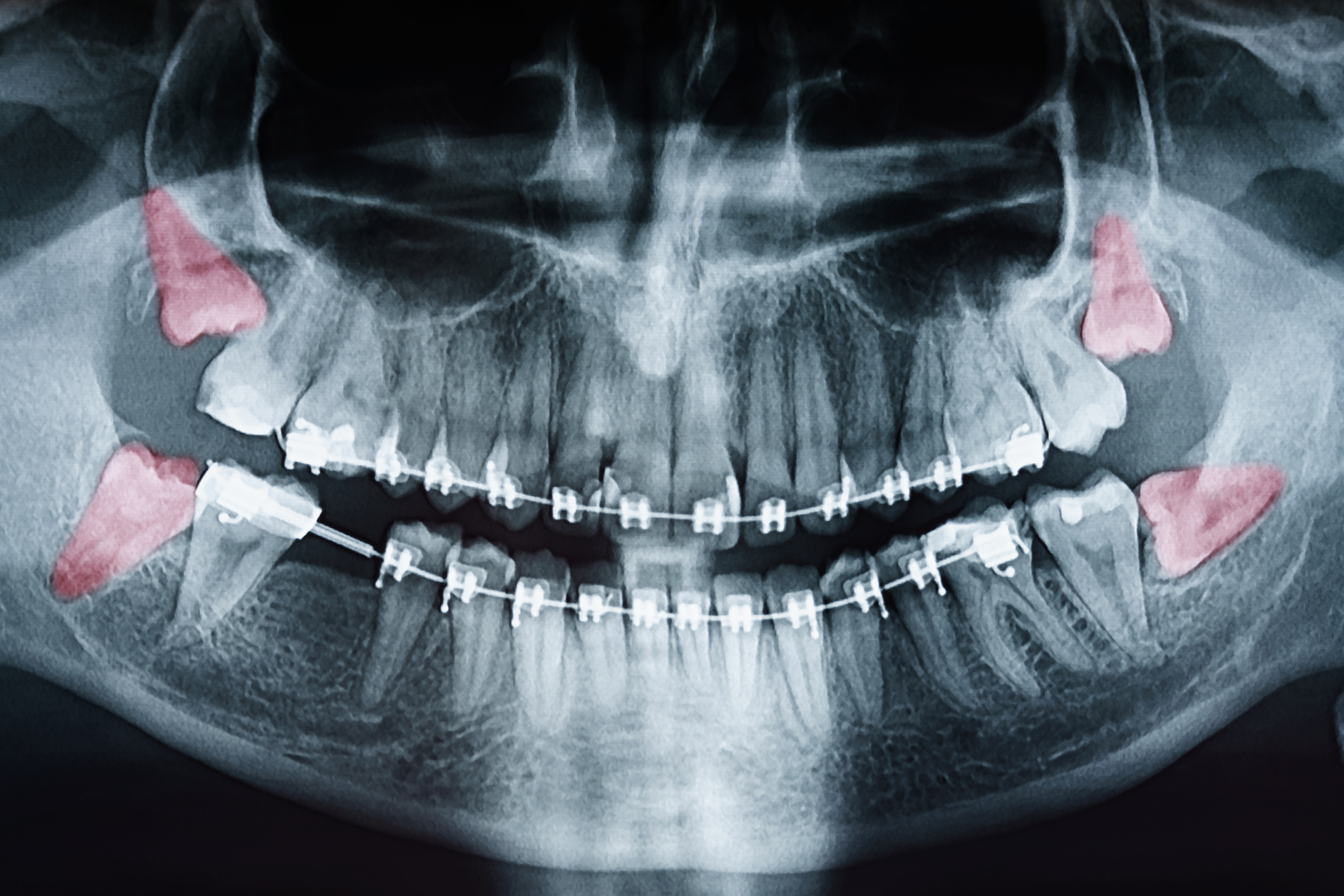An impacted wisdom tooth is trapped in either the jaw bone or the gums. It can cause significant pain and usually, a dentist will recommend surgery to take it out. However, sometimes it may not cause any dental effects and doesn’t always require removal. Each case is different.
Wisdom teeth are officially third molars. They are the teeth in the very back of the mouth on the upper and lower jaw. There are four wisdom teeth, one in each back corner of the mouth, that start breaking through the skin as a person becomes an adult. Ancient people started calling them wisdom teeth because they didn’t show up until someone was an adult and these teeth were often synonymous with maturity.
Most people start feeling their wisdom teeth coming in in their late teens and twenties. Some get them as young as 17 or 18 while others may not get their last wisdom teeth until closer to 30.
Wisdom teeth may or may not come in all at once. Everyone is different and some people may get one and not get another for a couple of years. Some never get any of them. You shouldn’t worry if you don’t get them at the same time or way your friends do.
What Is An Impacted Wisdom Tooth?
Some wisdom teeth are either fully or partially trapped in your jawbone or gums. Impacted teeth aren’t growing straight through as they should. They can cause pain, and cause other teeth to become crooked or decay. Impacted wisdom teeth can be a cause of infection, cavities, and gum disease.
Different Types of Impacted Wisdom Teeth
A wisdom tooth that is not impacted will be completely visible as it is growing straight through the gum line. These are easier for a dentist to pull than impacted teeth, which require more in-depth surgery.
Impacted wisdom teeth are caused when there isn’t enough space in the jaw for the teeth to grow normally. An impacted tooth may also happen when it grows at an angle.
A partially impacted wisdom teeth will grow some above the gum line but part of it remains hidden below the gum line. A fully impacted tooth can’t be fully seen but you can feel the effects of them.
Impacted Wisdom Teeth Symptoms
Symptoms of an impacted wisdom tooth may not be noticeable at first. They tend to happen over time. Also, just because you have one impacted wisdom tooth doesn’t mean you will have the same issues with the others. Each tooth can grow differently.
You will feel an impacted wisdom tooth when you start to have pain or swelling in your face where the tooth is growing. You may also have swollen, red, or bleeding gums. Other symptoms are bad breath, a weird taste in your mouth, and trouble opening your mouth wide.
Treatment of Impacted Wisdom Teeth
Those who think they may have an impacted wisdom tooth should see their dentist. Your dentist will do an exam and take X-rays to see the full effects of the impacted tooth. They will also want to see if the impacted wisdom tooth has damaged your jawbone or other teeth.
Dentists usually recommend that impacted wisdom teeth be removed to not cause oral issues later. This is done by oral surgery and is considered a preventive measure to reduce the possibility of future problems since impacted wisdom teeth aren’t always problematic when they first start erupting.
Oral surgery for impacted wisdom teeth may take more time than extracting a wisdom tooth growing normally but isn’t any riskier. It doesn’t necessarily equate to more pain either. A local anesthetic is given before surgery and you will take pain relievers post-surgery in both a normal extraction and oral surgery for an impacted wisdom tooth.
Every surgery has some risk and oral surgery for an impacted wisdom tooth is no different. There are three primary risks with this procedure. One is dry sockets where a blood clot left in surgery is dislodged too soon. This can expose your bone.
There are things you can do to reduce this risk. Your dental surgeon will tell you to avoid using straws for drinking to avoid this.
An infection could happen if food gets into the socket. Your oral surgeon will likely prescribe some antibiotics to take home to avoid this possibility.
The third primary risk is a risk to other things near your impacted tooth like your jawbone, nerves, other teeth, or sinuses. Surgical techniques are advanced enough that this is a low risk.
Recovery from oral surgery to remove an impacted wisdom tooth is between one and two weeks. You can return to work or school after a few days but may want to stick to soft foods for a week and slowly put your normal foods back into your diet after that.
Those who are experiencing pain from an impacted wisdom tooth and are concerned about how their wisdom teeth are growing should call us. We’ll perform an exam and X-rays to help you decide what to do about impacted wisdom teeth.




